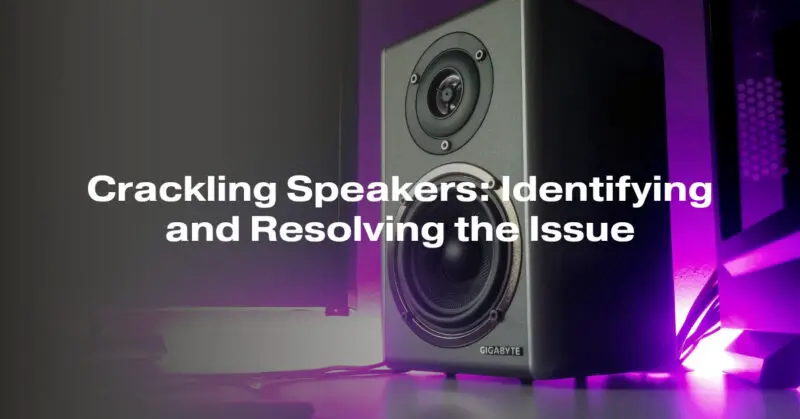Crackling or popping sounds from your speakers can be annoying and disrupt your audio experience. These issues may result from various causes, including equipment problems, audio source issues, or environmental factors. In this comprehensive guide, we’ll explore common causes of crackling speakers and provide practical solutions to help you identify and resolve the issue for clear and distortion-free sound.
Table of Contents:
- Understanding Crackling Speakers
- Defining crackling sounds and their impact on audio quality.
- Recognizing the signs of crackling speakers.
- The importance of addressing this issue for optimal audio performance.
- Check Audio Sources
- Evaluating the quality and integrity of your audio sources.
- Troubleshooting crackling caused by low-quality recordings or streaming.
- Identifying potential issues with audio cables and connectors.
- Speaker Placement and Room Acoustics
- How speaker placement and room acoustics can contribute to crackling.
- Positioning speakers for optimal sound dispersion and minimizing reflections.
- Using acoustic treatments to reduce interference and resonance.
- Cable and Connection Issues
- Inspecting audio cables and connectors for potential problems.
- Identifying loose or damaged cables that may cause crackling.
- Properly securing connections to speakers and audio sources.
- Amplifier and Receiver Settings
- Examining amplifier and receiver settings for potential issues.
- Ensuring the correct input sources and settings are selected.
- Adjusting volume levels, balance, and tone controls for clarity.
- Check for Dust and Debris
- Cleaning dust and debris from speaker components.
- How dirt and foreign objects can lead to crackling sounds.
- Safe cleaning methods for speaker drivers and grilles.
- Driver Damage and Suspension
- Identifying physical damage to speaker drivers (torn surrounds, damaged cones, etc.).
- How driver damage can result in crackling and reduced performance.
- Steps for repairing or replacing damaged speaker components.
- Equalization and Tone Adjustments
- Using equalization to address frequency-specific crackling.
- Adjusting tone controls to balance audio response and minimize distortion.
- Avoiding excessive boosting or cutting of frequencies.
- Amplifier and Electronics Inspection
- Evaluating the condition of amplifiers and source components.
- Identifying potential issues with electronics causing crackling.
- Maintaining and servicing amplifiers and electronic components.
- Testing with Different Audio Sources
- Using different audio sources to isolate crackling issues.
- Determining whether the problem is source-specific or system-wide.
- Troubleshooting and resolving crackling from specific sources.
- Professional Evaluation
- When to seek professional assistance for persistent crackling problems.
- Working with audio technicians or service centers for complex issues.
- Maintaining regular speaker and system maintenance.
- Conclusion
- Summarizing the common causes and practical fixes for crackling speakers.
- Empowering audio enthusiasts to identify and resolve crackling issues effectively.
- Enjoying clear and distortion-free sound in your audio system.
By the end of this guide, you’ll have a comprehensive understanding of common causes of crackling speakers and the practical steps needed to address them. Whether you’re troubleshooting a home audio system, a car audio setup, or professional sound equipment, this knowledge will help you enjoy clear and distortion-free sound in your audio system.


